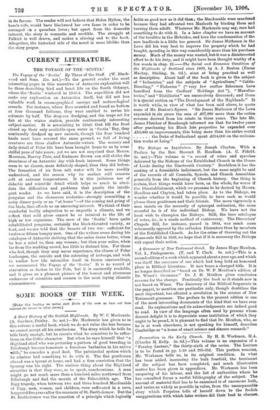SOME BOOKS OF THE WEEK.
[Under this heading we notice such Books of the week as have not been reserved for relnew in other forms.] A Short History of the Scottish Highlands. By W. C. Mackenzie. (A. Gardner, Paisley. 5s. net.)—Mr. Mackenzie has given us in this volume a useful book, which we do not value the less because we cannot accept all his conclusions. The story which he tells he tells fairly enough, but he resents what he conceives to be reflec- tions on the Celtic character. But when he says himself that "a Highland chief who was yesterday a pattern of good breeding in Edinburgh became tomorrow a ferocious barbarian in his native wilds," he concedes a good deal. The patriarchal system which he admires had something to do with it. The fine gentleman abroad was a tyrant at home, and had a firm conviction that the tyranny was his right. The curious thing about the Highland atrocities is that they were, so to speak, anachronisms. A man might go not much more than a hundred miles northward from Edinburgh and find the morals of the Palaeolithic age. The Eigg tragedy, when between two and three hundred Macdonalds of Eigg, men, women, and children, were suffocated in a cave, happened five years after the massacre of St. Bartholomew. But the St. Bartholomew was the assertion of a principle which logically holds as good now as it did then ; the Macdonalds were murdered because they had affronted two Maeleods by binding them and turning them adrift. Whatever Mr. Mackenzie may say, race had something to do with it. In a later chapter we have an account of the troubles in the Hebrides, and here the condemnation of the new landlords is a little too general. Sir James Matheson in the Laws did his very best to improve the property which he had bought, spending in this way considerably more than his purchase money. Much of the money was wasted, but it was a disinterested effort to do his duty, and it might have been thought worthy of a few words in chap. 21.—The Social and Economic Condition of the Highlands of Scotland since 1800, by A. J. Beaton (Eneas Mackay, Stirling, 3s. 6d.), aims at being practical as well as descriptive. About half of the book is given to the subject of "Industries," and the subjects of "Agriculture," "Cattle- Breeding," " Fisheries " (" very few crofter fishermen have benefited from the Crofters' Holdings Act "), " Manufac- tories," and "Distilleries" are successively discussed; and there is a special section on "The Development of the Highlands." It is worth while, in view of what has been said above, to quote some of Mr. Beaton's figures. "Sir James Matheson of the Lews expended in six years the sum of £67,980 more than the entire revenue derived from his estate in three years. The late Mr. James Fletcher of Rosehaugh informed me that for twelve years after purchasing his Black Isle properties he expended over -t10,000 on improvements, this being more than his entire rental the Duke of Sutherland spent £254,000 on the reclama- tion works at Lairg."














































 Previous page
Previous page